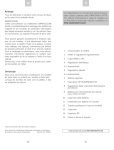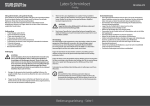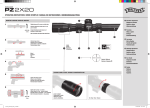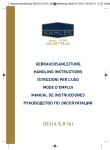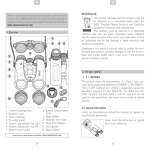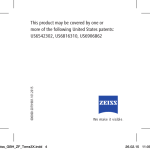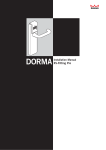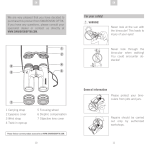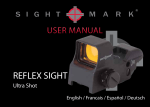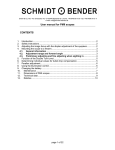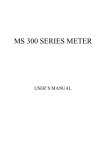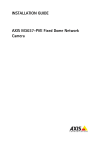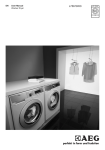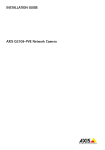Download INSTRUCTION MANUAL
Transcript
DE DE EN Wir haben alle Elemente und Oberflächen so ausgelegt, dass sie pflegeleicht sind. We are very pleased that you decided to purchase this product from Swarovski Optik. If you have any questions, please consult your specialist dealer or contact us directly at www.swarovskioptik.com. Reinigung SWAROCLEAN Durch die Antihaftwirkung der SWAROCLEAN Außenoberflächenbeschichtung wird das Reinigen von Objektiv- und Okularlinsen erheblich erleichtert, vor allem von eingetrockneten mineralischen Rückständen (z.B. Wasserflecken von Beschlag), Insektenschutzmitteln und Baumharz. Um die optische Brillanz Ihres Zielfernrohres dauerhaft zu gewährleisten, sollten Sie die Glasoberflächen schmutz-, öl- und fettfrei halten. Zur Reinigung der Optik entfernen Sie zuerst gröbere Partikel mit einem Optikpinsel. Zur nachfolgenden gründlichen Reinigung empfiehlt sich leichtes Anhauchen und Reinigung mit dem Reinigungstuch. Die Metallteile pflegen Sie am besten mit einem weichen, sauberen Putztuch. 1 Dioptric correction 2 Magnification adjustment ring 3 Screw-on cap 4 Elevation adjustment turret 4.1.Zero point adjustment 5 5.1.Zero point adjustment 6Knurled knob 7OFF/DAY/NIGHT switch 8 9 Aufbewahrung Sie sollten Ihr Zielfernrohr an einem gut gelüfteten, trockenen und dunklen Ort aufbewahren. Ist das Zielfernrohr nass, muss es vorher getrocknet werden. Windage adjustment turret Brightness control for reticle illumination Battery for reticle illumination (button cell CR 2032) 10 Battery cover 11Replacement battery box 12 Parallax turret (depending on model) 13 Protective cap 14 Swarovski Optik Rail cover 15 Coin opener SWAROVSKI OPTIK patents USA: • Zoom system: US 7,742,228 B2 • Reticle illumination HIGH GRID: US 7,804,643 B2 • SWAROVSKI OPTIK coil spring system: US 5,463,495 • Reticle adjusting system: US 5,513,440 • SR (SWAROVSKI OPTIK Rail): US 6,901,692 • Ballistic Turret: US 2008/0289239 A1 Alle Angaben sind typische Werte. Änderungen in Ausführung und Lieferung sowie Druckfehler sind vorbehalten. 14 BA-670-12, 10/2011 Please find our current product accessories at www.swarovskioptik.com. 15 EN DE DE EN Description For your safety! Z6/Z6i WARNING! Never use the rifle scope to look at the sun! This will lead to damage to your eyes! Please protect your rifle scope from unnecessary solar radiation. Please note the eye relief distance specified for a mounted rifle scope (see Data Sheet for dimensions). General Information Please protect your rifle scope against knocks. Reticle illumination 4 Repairs should only be carried out by authorized workshops. 6 4.1 Sealing 5 Thanks to the use of high-quality sealing elements and controlled fabrication processes, our rifle scopes are watertight and gas-tight to a pressure of 0.4 bar or a depth in water of 4.4 yds/4 m. Seal integrity is guaranteed even when the screw-on cap has been removed. Nevertheless, careful handling is advised, especially around the turrets. 5.1 11 16 17 EN DE The scope has been filled with nitrogen via the sealing screw located underneath the windage adjustment turret. Please do not loosen this sealing screw! DE EN When the shot is low Turn the knurled knob of the elevation turret in the direction of H (counter-clockwise). When the shot is high Turn the knurled knob of the elevation turret in the opposite direction to H (clockwise). Mounting Basic Alignment To ensure perfect alignment of the scope to the rifle, please have a competent gunsmith mount the scope. The reticle has been factory-set to the mechanical middle position. Prior to mounting you can check the correct position of the reticle. To do this, unscrew the screw-on caps of the elevation adjustment turret and windage adjustment turret. Now turn the respective knurled knob of the elevation adjustment turret and windage adjustment turret clockwise until it reaches the stop. Then turn the knurled knob back again counter-clockwise until it reaches the stop and count the clicks at the same time. Halve the number of clicks and you will have the exact middle position. Repeat this procedure for the second turret. When the shot is to the left Turn the knurled knob of the windage turret in the direction of R (counterclockwise). When the shot is to the right Turn the knurled knob of the windage turret in the opposite direction to R (clockwise). The impact point correction per click can be taken from the enclosed technical data sheet or the information printed on the elevation or windage adjustment turret of your rifle scope. Alignment of the Scope to the Rifle If the point of impact of the bullet deviates from the aiming point, this can be easily and precisely corrected by adjusting the elevation turret and the windage turret of the scope. Regardless of corrections, the middle point of the aiming mark always stays in the middle of the field of view. Zero Point Adjustment To make adjustments, simply unscrew the screw-on caps of the elevation and windage turrets. Once you have aligned the scope to the rifle, you can retain this basic setting. The scale for this is located on the respective knurled knob of the elevation/ windage adjustment turret. 18 19 EN DE DE EN 1. P ull the knurled knob upwards. In this position the reticle is not adjusted when the knurled knob is twisted. 2.Turn the knurled knob until the zero point of the scale is aligned with the index point on the scope. 3.Pushing the knurled knob back down re-engages the reticle adjustment and the knurled knob. Your individual setting is now precisely adjusted as the zero point. The Reticle in the 2nd Image Plane (Eyepiece Image Plane) If the magnification increases, then the reticle remains the same size – the size of the image is increased but not the size of the reticle. Even for large magnifications only a little of the target is covered. The reticle can only be used for estimating the distance to a limited extent. Operation Adjusting the Focus Simply turn the dioptric correction ring to achieve the best focus for your individual setting of the reticle. First turn the dioptric correction ring all the way to the left ➀ (counter-clockwise) and then to the right ➁, until the reticle is optimally focused. The adjustment ranges depend on the individual models. Please consult the technical data sheet enclosed. Changing the Magnification You can set the desired magnification by turning the (stepless) magnification adjustment ring through 180°. The scale on the adjustment ring allows simple and easy reading of the setting. The soft, ribbed covering of the adjustment ring has a nose for better orientation. 20 Parallaxe Your rifle scope is set to be parallax-free without parallax turret at a target distance of 110 yards (100 m). This means that at a distance of 110 yards (100 m), the image of the object aimed at and the image of the reticle are in a single plane. Please take into consideration: With shots at distances greater or less than 110 yards (100 m), take care to position the eye carefully central to the scope. This will prevent shifting of the impact point due to parallax errors. Operation of the Parallax Turret (depending on model) Using the parallax turret, you can adjust the optimum focus for every target distance thus preventing aiming errors due to parallax. 21 EN DE a) Rapid Adjustment The target distances are printed on the parallax turret from 50 m to ∞. Turn the parallax turret until the index point indicates the desired distance. The parallax turret also features a detent at 100 m, allowing you to feel when this point has been reached, especially in twilight. b) Precision adjustment Set the magnification as high as possible and turn the parallax turret until the image appears at its sharpest. Now move the eye backwards and forwards within the range of the exit pupil. If in the process the reticle moves in relation to the image, correct the distance setting until it is no longer possible to discern any difference between the movement of the reticle and the movement of the image. DE EN 3. Switching off To do this, turn the OFF/ DAY/NIGHT switch to the center position. 4. Memory function When turning off the illumination unit, the last brightness setting used for DAY or NIGHT will be stored and automatically activated when the unit is turned on again. Operation of the Reticle Illumination 1. OFF/DAY/NIGHT switch 5. Automatic turn-off function First of all choose between daytime (symbol) and twilight (symbol) illumination by turning the switch to the appropriate position. The illumination of the unit automatically turns off if no brightness adjustment has been carried out within a period of 3 hours during the day or 5 hours at night. 6. SWAROLIGHT The illuminated Z6 models are equipped with an intelligent tilt sensor. This senses whether or not the rifle scope is in a shooting position and transmits this information to the illumination unit. The rifle scope switches off if the tilt angle exceeds 70° (upwards or downwards), if you position the weapon on the turret at a right angle, for example. 2. Brightness control You can now adjust the brightness in the mode selected by means of the +/– button. To quickly find the optimum brightness, the button can remain pressed (sustained pulse). You can make fine adjustments by pressing the buttons once (individual pulse). 22 23 EN DE DE EN The rifle scope also switches off if the lateral tilt exceeds 30° (if you rest the weapon on your legs, for example). When the weapon is returned to the shooting position, the illumination automatically switches on. • When installing the new battery (type CR 2032) please make sure that the side marked “+” is facing upwards. • Replace the battery cover by matching the two markings and turning it clockwise a quarter turn. You can also deactivate the SWAROLIGHT function by pressing the +/keys at the same time for 5 seconds. The illumination point will blink twice to confirm the changeover. The SWAROLIGHT function can be reactivated by repeating this action. 7. Battery power indicator If the illuminated reticle begins to flash, this signifies that a battery change will soon be needed. The remaining operating time will be a few hours, depending on the brightness adjustment and ambient temperature. 8. Changing the battery • Turn off the reticle illumination. • Remove the battery cover with the coin opener provided turning it counter clockwise. With a quarter turn, the cover lifts off its mounting for easy removal. Batteries Directive Batteries must not be disposed of as household waste and you are legally obliged to return used batteries. Local facilities exist for returning used batteries free of charge (e.g. in retail outlets or at communal collection points). Batteries are labelled with a crossed-out wheeled bin and the chemical symbol of the harmful substance they contain: “Cd” for cadmium, “Hg” for mercury and “Pb” for lead. Please help us to protect the environment. Please note! The last brightness setting stored will be lost when the battery is changed. When turned on, the illumination unit will revert to the medium brightness setting in the day range. 9. Battery operating hours Consult the technical data sheet enclosed! 10. Conformity The reticle illumination unit complies with Directive No. 2004/108/EG regarding electromagnetic compatibility. • Remove the old battery. 24 25 EN DE DE EN Attach spare battery container Cleaning We have designed all elements and surfaces to require very little care. SWAROCLEAN The SWAROCLEAN non-stick outer surface coating makes it much easier to clean objective lenses and eyepiece lenses, especially of any dried-on mineral deposits (e.g. water marks from condensation), insect repellents and tree resin. Battery To ensure the long-lasting optical brilliance of your rifle scope, you should keep the glass surfaces free from dirt, oil and grease. When cleaning the lenses, first remove larger particles with an optical lens brush. For subsequent thorough cleaning, breathe lightly on the lens and clean with the cleaning cloth. The metal parts are best cleaned with a soft, clean cloth. CR 2032 Covering the Swarovski Optik Rail The cover provided serves to protect the exposed rail parts. It may be cut to the required size and pressed into the rail by hand. Storage You should keep your rifle scope in a well-ventilated, dry, dark place. If the rifle scope is wet, it must be dried prior to storage. Maintenance and Care Lens-Cleaning Cloth The special microfibre cloth can be used to clean even the most sensitive glass surfaces. It is suitable for objective lens, eyepieces and spectacles. Please keep the microfiber cloth clean as dirt particles can damage the lens surface. If the cloth is dirty, it may be washed in lukewarm soapy water and allowed to dry naturally. Please use it exclusively for cleaning lens surfaces. 26 All details are typical values. We reserve the right to make changes regarding design and delivery. We accept no liability for printing errors. BA-670-12, 10/2011 27







